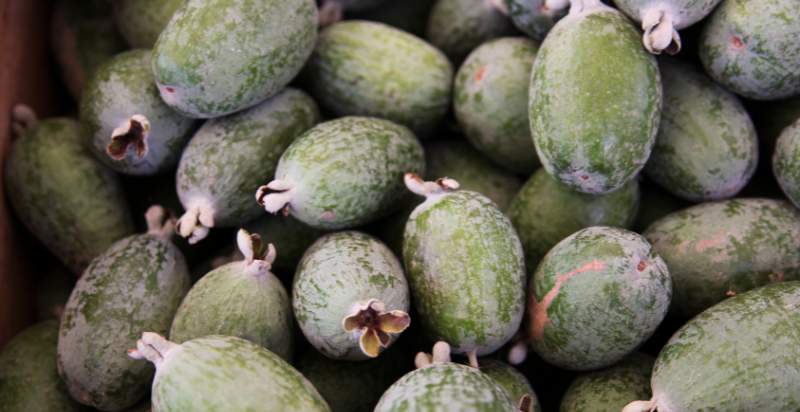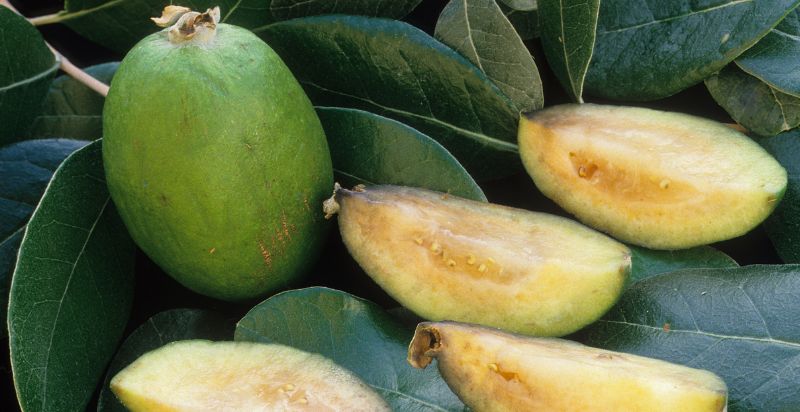Pineapple guava, or feijoa, is an exotic fruit native to South America. It has a unique flavor and aroma that makes it popular among home gardeners and commercial growers alike. The pineapple guava tree produces small, oval-shaped fruits with greenish-yellow skin and white flesh. The juicy pulp is sweet, tart, and aromatic – reminiscent of pineapple, guava, and citrus flavors.
Description / Taste:
Pineapple guava is a small, oval-shaped fruit with greenish-yellow skin and white flesh. The juicy pulp has a sweet, tart, and aromatic flavor reminiscent of pineapple, guava, and citrus. It also has a slight musky aroma that many find pleasant. The texture of the flesh ranges from soft to slightly crunchy, and the seeds are hard but edible.
Seasons / Availability:
Pineapple guava is available in the late summer and early fall months. It can be found at farmers’ markets, specialty grocery stores, and sometimes in supermarkets.
Geography / History:
Pineapple guava is native to South America and growing wild in Argentina, Brazil, Paraguay, Uruguay, Bolivia, and Chile. It was introduced to Europe in the 17th century and has become popular worldwide for its unique flavor and aroma.
Applications of Pineapple Guava:
Pineapple guava has a unique flavor and aroma, making it an excellent addition to sweet and savory dishes. It can be eaten raw as a snack or sliced up in salads, juices, smoothies, desserts, and sauces. The fruit can also be cooked into pies, tarts, jams, jellies, and compotes. The floral aroma of it pairs particularly well with pork, chicken, and seafood dishes.
Nutritional Value of Pineapple Guava:
Pineapple guava is a great source of dietary fiber, magnesium, vitamin C, and antioxidants. It also contains folate, potassium, and manganese. The fruit is beneficial for reducing inflammation, promoting good gut health, and fighting off infections.
Health Benefits of Pineapple Guava:
The high level of antioxidants found in pineapple guava is beneficial for reducing inflammation and fighting off infections. The vitamins and minerals in the fruit can help promote healthy skin, bones, and teeth, while dietary fiber helps maintain a healthy digestive system. It can also boost your immune system and help protect against diseases such as cancer.
Storage of Pineapple Guava:
Pineapple guava can be stored at room temperature for up to a week or in the refrigerator for up to two weeks. The fruit is best consumed when it is still slightly firm and before the skin wrinkles. After being sliced open, the flesh should be eaten within a few days or stored in an airtight container in the refrigerator.

Tips & Tricks:
When selecting pineapple guava, look for firm fruits with bright green skin. Avoid fruits with wrinkled or dull-looking skin, as they may not be ripe yet. If you can’t find pineapple guavas at your local grocery store, you can buy them online or from specialty stores.
If you’re looking for a way to add it to your diet without consuming it raw, try using it in jams, jellies, and compotes. The sweet aroma of the fruit will pair perfectly with pork, chicken, or seafood dishes. To add a unique flavor, you can also mix it with other fruits in juices, smoothies, and salads.
Pineapple guava can be cooked into pies, tarts, and baked goods for an exotic twist. Its high antioxidants make it an ideal ingredient for making healthy desserts.
How to Use Pineapple Guava?
Pineapple guava can be eaten raw, cooked, or blended into smoothies. It makes a great addition to salads, sauces, and desserts and pairs particularly well with pork, chicken, and seafood dishes. The fruit juice can also be used in cocktails and mocktails for a unique tropical flavor.
For an easy and healthy snack, try slicing it and sprinkling it with cinnamon. If you want a more indulgent treat, try baking the slices into pies, tarts, or cakes. You can also make jams, jellies, and compotes to serve with toast or crackers. It can also be added to juices, smoothies, and cocktails for a sweet tropical flavor.
No matter how you use it, pineapple guava will surely add a unique flavor and aroma to any dish.

Recipes to Use:
Here are a few delicious recipes that feature pineapple guava:
- Pineapple Guava Cake with White Chocolate Frosting
- Pineapple Guava Jam
- Pineapple Guava Sorbet
- Grilled Chicken with Pineapple Guava Glaze
- Caribbean-Style Pork Tenderloin with Pineapple Guava Sauce
- Pineapple Guava Mojitos
- Pineapple Guava Smoothie Bowl
- Baked Pineapple Guava Empanadas
- Pineapple Guava Salsa with Homemade Chips
Enjoy exploring the unique flavor of pineapple guava in these recipes.
Conclusion:
Pineapple guava is a unique and delicious tropical fruit with vitamins, minerals, and antioxidants. It can be eaten raw, cooked, or blended into smoothies for an exotic flavor. The fruit juice can also be used in cocktails and mocktails for a unique tropical taste. Whether looking for a healthy snack or an indulgent treat, pineapple guava will surely add a unique flavor and aroma to any dish. Try exploring some of the abovementioned recipes and enjoy all the health benefits this delicious fruit offers.
Happy Cooking! 🙂
- Everything You Wanted to Know About Red Tamarillos - June 2, 2025
- A Guide to Tulips: Everything You Need to Know & More… - June 2, 2025
- Guanabana: Description, Flavor, Benefits, And Uses - May 27, 2025

4 thoughts on “Pineapple Guava: Description, Flavor, Benefits, And Uses”
Comments are closed.